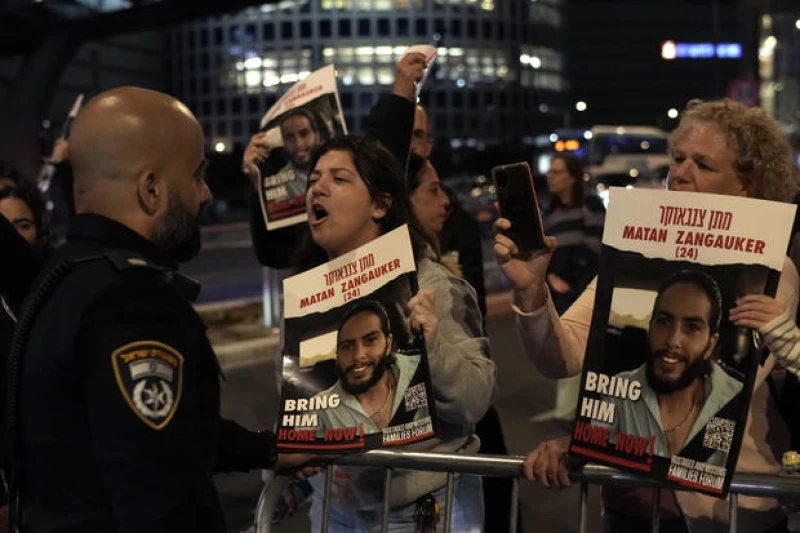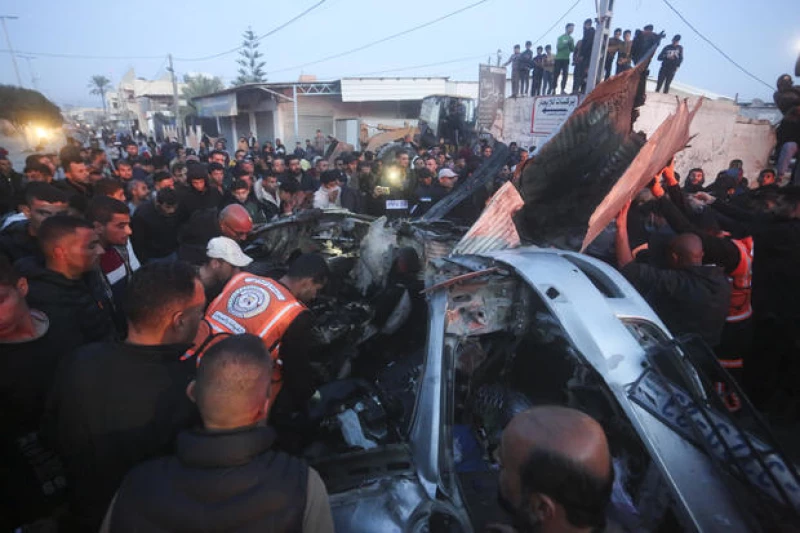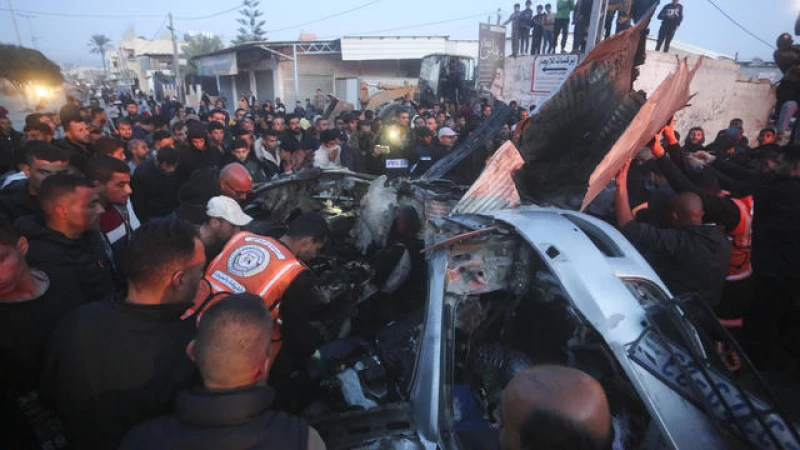Israeli-Palestinian Conflict: Death Toll Rises and Hostages Remain
The number of Palestinian casualties in the ongoing war between Israel and Hamas has surpassed 25,000, according to the Hamas-run Health Ministry in the Gaza Strip. Meanwhile, the Israeli government seems far from achieving its objectives of crushing the militant group and securing the release of over 100 hostages.
This conflict has resulted in an unprecedented level of death, destruction, and displacement in the Israeli-Palestinian conflict that has spanned decades. Israeli officials anticipate that the fighting will continue for several more months.
The situation has caused division among Israelis and their leaders, while the offensive poses a risk of triggering a broader war involving Iran-backed groups in Lebanon, Syria, Iraq, and Yemen, who support the Palestinians.
On Sunday, the Israeli Air Force conducted two rounds of strikes on "terrorist infrastructure," which included a military building, a launch post, and an observation post belonging to the Iran-backed militant group Hezbollah, as confirmed by the Israeli military. Israel also targeted multiple locations in southern Lebanon, including a Hezbollah command center and military compound.
Earlier, on Saturday, at least five Iranians were killed in an Israeli strike on Damascus, Syria's capital city, which targeted a building used by the Iranian paramilitary Revolutionary Guard, according to Syrian and Iranian officials. And, on Thursday, Yemen-based Houthi rebels launched missiles at a merchant vessel owned by the United States, the Pentagon said, marking the latest attack from the militant group, which is similarly backed by Iran, on commercial ships in and around the Red Sea. It was the rebel group's third strike last week targeting U.S.-owned vessels.
Violence has also spiked in the occupied West Bank. On Friday, a Palestinian-American teenager was shot and killed by Israeli troops in the West Bank, a Palestinian official told Reuters.
In Lebanon, Hezbollah forces have engaged in near-daily clashes with Israeli troops along the border.
The United States, which has provided essential diplomatic and military support for Israel's offensive, has had limited success in persuading Israel to minimize the risk to civilians and to facilitate the delivery of more humanitarian aid.
Israeli Prime Minister Benjamin Netanyahu has rejected U.S. and international calls for postwar plans that would include a path to Palestinian statehood. U.N. Secretary-General Antonio Guterres called the refusal to accept a two-state solution "totally unacceptable."
"The Middle East is a volatile region. We must take all necessary measures to prevent conflict from erupting across the area," a spokesperson for the United Nations stated on Sunday. "And that begins with an immediate ceasefire to alleviate the suffering in Gaza."
The conflict began when Hamas launched a surprise attack in southern Israel on October 7th. The attack resulted in the deaths of approximately 1,200 people, mostly civilians, and around 250 hostages were taken back to Gaza.
In response, Israel carried out a bombing campaign and ground invasion that devastated entire neighborhoods in northern Gaza and gradually spread southwards. The current ground operations are focused on the southern city of Khan Younis and the refugee camps in central Gaza, which date back to the 1948 war surrounding the creation of Israel.
Israel continues to conduct airstrikes throughout the besieged territory, including areas in the south where civilians were advised to seek shelter. However, many Palestinians have chosen to disregard evacuation orders, as they feel unsafe anywhere.
According to the Health Ministry, since the start of the war, 25,105 Palestinians have been killed in Gaza, with an additional 62,681 wounded. The toll includes the 178 bodies that have been brought to Gaza's hospitals since Saturday. The spokesperson for the Health Ministry, Ashraf al-Qidra, also noted that another 300 people were injured in the past day.
The overall death toll is believed to be higher, as many casualties are still buried under the rubble from Israeli airstrikes or in areas that are inaccessible to medical personnel, Al-Qidra explained.
The Human Cost of the Gaza Conflict
In the ongoing conflict between Israel and Hamas, the civilian death toll continues to rise. The latest figures from the Hamas-run Health Ministry show that around two-thirds of the people killed in Gaza were women and minors. The ministry, which is part of the Hamas-run government, has been consistent with its casualty figures from previous wars, aligning with those of U.N. agencies and even the Israeli military.
The Israeli military, on the other hand, claims to have killed around 9,000 militants but has not provided any evidence to support this claim. They attribute the high civilian death toll to Hamas, stating that the militant group positions fighters, tunnels, and other infrastructure in densely populated areas, often near homes, schools, and mosques.

Since the start of the Gaza offensive, the Israeli military reports that 195 soldiers have been killed.
The impact of the war on the residents of Gaza has been devastating. Approximately 85% of the population has been displaced from their homes, seeking refuge in U.N.-run shelters and tent camps in the southern part of the enclave. U.N. officials estimate that a quarter of the population, or 2.3 million people, are currently experiencing extreme hunger due to limited access to humanitarian aid caused by the fighting and Israeli restrictions.
Ahmad Al-Nashawi, who is currently living in a camp in the southern city of Rafah, expressed the dire situation, stating, "Bread does not suffice for one hour. You can see how many children we have other than women and men. What matters most for a child is to eat."
Israeli Prime Minister Benjamin Netanyahu has vowed to continue the offensive until Israel achieves "complete victory" over Hamas and secures the release of all remaining hostages. However, some top Israeli officials have started to acknowledge that these goals may be mutually exclusive.
Hamas Holds Hostages in Tunnels, Using Them as Shields
Hamas is believed to be holding captives in tunnels and using them as shields for its top leaders. Israel has managed to rescue only one hostage, and Hamas claims that several have been killed in Israeli airstrikes or during failed rescue operations.

A member of Israel's War Cabinet, former army chief Gadi Eisenkot, stated last week that the only way to free the hostages is through a cease-fire. He implicitly criticized Netanyahu, saying that claims to the contrary amount to "illusions."
Hamas has declared that it will not release any more hostages until Israel ends its offensive. The group is expected to demand the freedom of thousands of Palestinians imprisoned in Israel, including high-profile militants involved in attacks that killed Israelis, as a condition for further releases.
Israel's government has currently ruled out this demand, but it is facing increasing pressure from the families of the hostages, who are advocating for an exchange similar to the one that occurred during a weeklong November cease-fire.
Some Israelis are also expressing frustration with the security failures leading up to the October 7 attack and with Netanyahu's handling of the war. Thousands of people gathered in Tel Aviv over the weekend to call for new elections.
Israeli Coalition Calls for Voluntary Emigration of Palestinians from Gaza
Israel's far-right coalition partners are pressuring Prime Minister Netanyahu to intensify the ongoing offensive in Gaza. Some members of the coalition are advocating for the "voluntary" emigration of hundreds of thousands of Palestinians from Gaza and the re-establishment of Jewish settlements in the region. In 2005, Israel withdrew its soldiers and settlers from Gaza, two years before Hamas took control from rival Palestinian forces.







